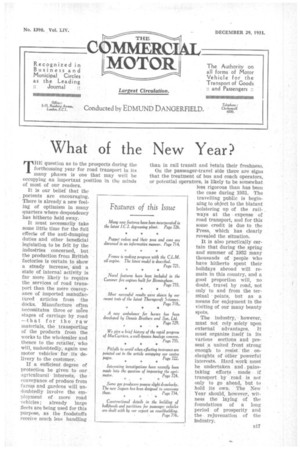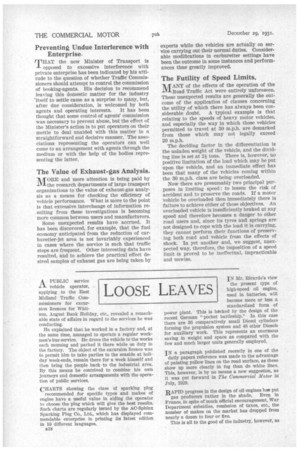What of the New Year?
Page 31

Page 32

If you've noticed an error in this article please click here to report it so we can fix it.
THE question as to the prospects during the forthcoming year for road transport in its many phases is one that may well be occupying an important position in the minds of most of our readers.
It is our belief that the portents are encouraging.
There is already a new feeling of optimism in many quarters where despondency has hitherto held sway.
It must necessarily take some little time for the full effects of the anti-dumping duties and other beneficial legislation to be felt by the industries concerned, but the production from British factories is certain to show a steady increase, and a state• of internal activity is far more likely to require the services. of road transport than the mere conveyance of imported manufactured articles from the docks. Manufacture often necessitates three or rare stages of carriage by road —that for the raw materials, the transporting of the products from the works to the wholesaler and thence to the retailer, who will, undoubtedly, again use motor vehicles for its delivery to the customer.
If a sufficient degree of protection be given to our agricultural interests, the conveyance of produce from farms and gardens will undoubtedly involve the employment of more road vehicles; already large fleets are being used for this purpose, as the foodstuffs receive much less handling than in rail transit and i•etain their freshness. On the passenger-travel side there are signs that the treatment of bus and coach operators, or potential operators, is likely to be somewhat less rigorous than has been the case during 1931. The travelling public is begin ning to object to the blatant bolstering up of the rail, ways at the expense of road transport, and for this some credit is due to the Press, which has clearly revealed the situation.
It is also practically certain that during the spring and' summer of 1932 many thousands of people Who have hitherto spent their holidays abroad will remain in this country, and a good proportion will, no doubt, travel by road, not only to and from the terMina' points, but as a means for enjoyment in the visiting of our many beauty spots.
The industry, however, must not rely solely upon external "advantages. It must organize itself in its various sections and present ,a united front strong enough to resist the onslaughts of Other powerful interests. Hard work must be undertaken and painstaking efforts made if transport by road is not only to go ahead, but to hold its own. The New rear should, however, witness the laying of the foundations of a long period of prosperity and the rejuvenation of the Industry.
Preventing Undue Interference with Enterprise.
THAT the new Minister of Transport is opposed to excessive interference with private enterprise has been indicated by his attitude to the question of whether Traffic Commissioners should attempt to control the commission of booking-agents. His decision to recommend leaving this domestic matter for the industry 'itself to settle came as a surprise to many, but, after due consideration, is welcomed by both agents and operating interests. It has been thought that some control of agents' commission was necessary to prevent abuse, but the effect of the Minister's action is to put operators on their mettle to deal unaided with this matter in a straightforward and decisive manner. The associations representing the operators can well come to an arrangement with agents through the medium or with the help of the bodies representing the latter.
The Value of Exhaust-gas Analysis.
11 ORE and more attention is being paid by the research departments of large transport organizations to the value of exhaust-gas analysis as a means for checking the efficiency of vehicle performance. What is more to the point is that extensive interchange of information resulting from these investigations is becoming more common between users and manufacturers. Some unexpected results have accrued. It has been discovered, for example, that the fuel economy anticipated from the reduction of carburetter-jet area is not invariably experienced in cases where the service is such that traffic stops are frequent. Other interesting data have resulted, and to achieve the practical effect desired samples of exhaust gas are being taken by experts while the vehicles are actually on service carrying out their normal duties. Considerable modifications in carburetter settings have been the outcome in some instances and performances thus greatly improved.
The Futility of Speed Limits.
/[ANY of the effects of the operation of the -A-Y-1-Road Traffic Act were entirely unforeseen. These unexpected results are generally the outcome of the application of clauses concerning the utility of which there has always been considerable doubt. A typical example is that relating to the speeds of heavy motor vehicles, and especially the way in which those vehicles permitted to travel at 30 m.p.h. are demarked from those which may not legally exceed 20 m.p.h.
The deciding factor in the differentiation is the unladen weight of the vehicle, and the dividing line is set at 2it tons. There is, however, no positive limitation of the load which may be put upon the vehicle, and an immediate effect has been that many of the vehicles coming within the 30 m.p.h. class are being overloaded.
Now there are presumably two principal purposes in limiting speed : to lessen the risk of• accident and to preserve the roads. If a motor vehicle be overloaded then immediately there is failure to achieve either of those objectives. An overloaded vehicle is insufficiently braked at any speed and therefore becomes a danger to other road users and, since its tyres and springs are not designed ta cope with the load it is carrying, they cannot perform their functions of preserving both road and vehicle from the effects of shock. In yet another and, we suggest, unexpected way, therefore, the imposition of a speed limit -is proved to be ineffectual, impracticable and unwise.




























































































